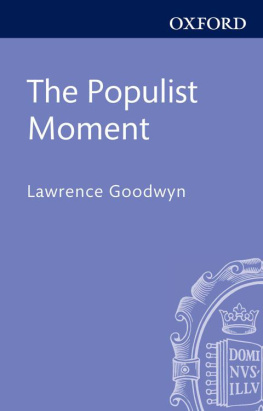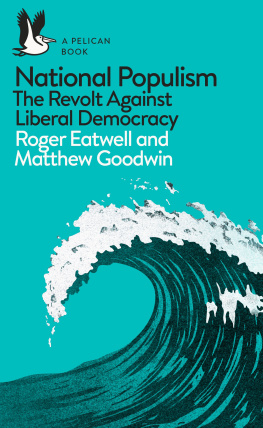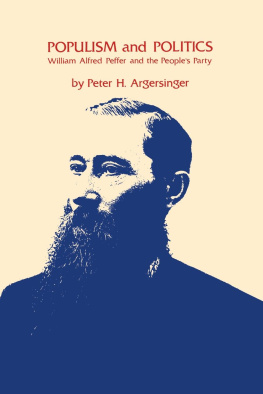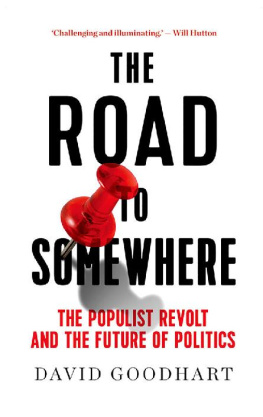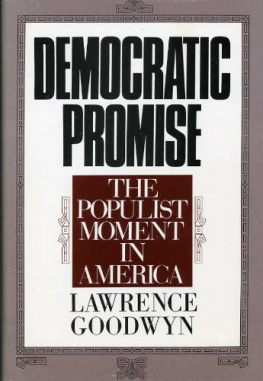Goodwyn - The Populist Moment: A Short History of the Agrarian Revolt in America
Here you can read online Goodwyn - The Populist Moment: A Short History of the Agrarian Revolt in America full text of the book (entire story) in english for free. Download pdf and epub, get meaning, cover and reviews about this ebook. City: Oxford;USA, year: 1979;1978, publisher: Oxford University Press, genre: Politics. Description of the work, (preface) as well as reviews are available. Best literature library LitArk.com created for fans of good reading and offers a wide selection of genres:
Romance novel
Science fiction
Adventure
Detective
Science
History
Home and family
Prose
Art
Politics
Computer
Non-fiction
Religion
Business
Children
Humor
Choose a favorite category and find really read worthwhile books. Enjoy immersion in the world of imagination, feel the emotions of the characters or learn something new for yourself, make an fascinating discovery.
The Populist Moment: A Short History of the Agrarian Revolt in America: summary, description and annotation
We offer to read an annotation, description, summary or preface (depends on what the author of the book "The Populist Moment: A Short History of the Agrarian Revolt in America" wrote himself). If you haven't found the necessary information about the book — write in the comments, we will try to find it.
Goodwyn: author's other books
Who wrote The Populist Moment: A Short History of the Agrarian Revolt in America? Find out the surname, the name of the author of the book and a list of all author's works by series.
The Populist Moment: A Short History of the Agrarian Revolt in America — read online for free the complete book (whole text) full work
Below is the text of the book, divided by pages. System saving the place of the last page read, allows you to conveniently read the book "The Populist Moment: A Short History of the Agrarian Revolt in America" online for free, without having to search again every time where you left off. Put a bookmark, and you can go to the page where you finished reading at any time.
Font size:
Interval:
Bookmark:
The Populist Moment
A Short History of the Agrarian Revolt in America
LAWRENCE GOODWYN
OXFORD UNIVERSITY PRESS
Oxford London New York
OXFORD UNIVERSITY PRESS
Oxford London Glasgow New York Toronto Melbourne Wellington Nairobi Dar es SalaamCape Town Kuala Lumpur Singapore Jakarta Hong Kong Tokyo Delhi Bombay Calcutta Madras Karachi
printing, last digit: 29 28 27 26 25 24 23 22 21
This book is an abridged edition of DEMOCRATIC PROMISE:
The Populist Moment in America
(Oxford University Press, 1976)
Copyright 1978
by Lawrence Goodwyn
Library of Congress Cataloging in Publication Data
Goodwyn, Lawrence. The Populist moment. Abridged ed. of Democratic promise. Bibliography: p. Includes index. 1. Populism United States History. 2. United States Politics and government 1865 -1900. I. Title. E669.G672 1978 239.88009 78-1349 ISBN 0-19-502416-8 ISBN 0-19-502417-6 pbk.
Printed in the United States of America
First published by
Oxford University Press, 1978
First issued as an Oxford University Press
paperback, 1978
To Nell
This book is about the flowering of the largest democratic mass movement in American history. It is also necessarily a book about democracy itself. Finally it is about why Americans have far less democracy than they like to think and what would have to happen to alter that situation.
The passionate events that are the subject of this book had their origins in the social circumstances of a hundred years ago when the American population contained huge masses of farmers. A large number of people in the United States discovered that the economic premises of their society were working against them. These premises were reputed to be democratic America after all was a democratic society in the eyes of most of its own citizens and in the eyes of the world but farmers by the millions found that this claim was not supported by the events governing their lives.
The nations agriculturalists had worried and grumbled about the new rules of commerce ever since the prosperity that accompanied the Civil War had turned into widespread distress soon after the war ended. During the 1870s they did the kinds of things that concerned people generally do in an effort to cope with hard times. In an occupation noted for hard work they worked even harder. When this failed to change things millions of families migrated westward in an effort to enlist natures help. They were driven by the thought that through sheer physical labor they might wring more production from the new virgin lands of the West than they had been able to do in their native states of Ohio and Virginia and Alabama. But, though railroad land agents created beguiling stories of Western prosperity, the men and women who listened, and went, found that the laws of commerce worked against them just as much in Kansas and Texas as they had back home on the eastern side of the Mississippi River.
So in the 1870s, the farmers increasingly talked to each other about their troubles and read books on economics in an effort to discover what had gone wrong. Some Of them formed organizations of economic self-help like the Grange and others assisted in pioneering new institutions of political self-help like the Greenback Party. But as the hard times of the 1870s turned into the even harder times of the 1880s, it was clear that these efforts were not really going anywhere. Indeed, by 1888 it was evident that things were worse than they had been in 1878 or 1868. More and more people saw their farm mortgages foreclosed. As everyone in rural America knew, this statistic inexorably yielded another, more ominous one: the number of landless tenant farmers in America rose steadily year after year. Meanwhile, millions of small landowners hung on grimly, their unpaid debts thrusting them dangerously close to the brink of tenantry and peonage. Hard work availed nothing. Everywhere the explanation of events was the same: Times were hard.
Then gradually, in certain specific ways and for certain specific reasons, American farmers developed new methods that enabled them to try to regain a measure of control over their own lives. Their efforts, halting and disjointed at first, gathered form and force until they grew into a coordinated mass movement that stretched across the American continent from the Atlantic coast to the Pacific. Millions of people came to believe fervently that a wholesale overhauling of their society was going to happen in their lifetimes. A democratic new day was coming to America. This whirlwind of effort, and the massive upsurge of democratic hopes that accompanied it, has come to be known as the Populist Revolt. This book is about that moment of historical time. It seeks to trace the planting, growth, and death of the mass democratic movement known as Populism.
For a number of reasons, all of them rather fundamental to historical analysis, the Populist moment has proved very difficult for Americans to understand. Under the circumstances, it is probably just as well to take these reasons up one at a time at the very outset in an effort to clear away as much underbrush as possible before turning our attention to the protesting farmers of the 1890s.
There are three principal areas of interpretive confusion that bear directly on the Populist experience. First, very little understanding exists as to just what mass democratic movements are, and how they happen. Second, there are serious problems embedded in the very language of description modern Americans routinely employ to characterize political events. These problems particularly affect commonly held presumptions about how certain classes of people are supposed to act on the stage of history. Finally, and by all odds most importantly, our greatest problem in understanding protest is grounded in contemporary American culture. In addition to being central, this cultural difficulty is also the most resistant to clear explanation: we are not only culturally confused, our confusion makes it difficult for us even to imagine our confusion. Obviously, it is prudent, then, to start here.
The reigning American presumption about the American experience is grounded in the idea of progress, the conviction that the present is better than the past and the future will bring still more betterment. This reassuring belief rests securely on statistical charts and tables certifying the steady upward tilt in economic production. Admittedly, social problems have persisted inequities of income and opportunity have plagued the society but these, too, have steadily been addressed through the sheer growth of the economy. For all of its shortcomings, the system works.
This is a powerful assumption. It may be tested by reflecting upon the fact that, despite American progress, the society has been forced to endure sundry movements of protest. In our effort to address the inconvenient topic of protest, our need to be intellectually consistent while thinking within the framework of continuous progress has produced a number of explanations about the nature of dissent in America. Closely followed, these arguments are not really explanations at all, but rather the assertion of more presumptions that have the effect of defending the basic intuition about progress itself. The most common of these explanations rests upon what is perceived to be a temporary malfunction of the economic order: people protest when times are hard. When times stop being hard, people stop protesting and things return to normal that is to say, progress is resumed.
Unfortunately, history does not support the notion that mass protest movements develop because of hard times. Depressed economies or exploitive arrangements of power and privilege may produce lean years or even lean lifetimes for millions of people, but the historical evidence is conclusive that they do not produce mass political insurgency. The simple fact of the matter is that, in ways that affect mind and body, times have been hard for most humans throughout human history and for most of that period people have not been in rebellion. Indeed, traditionalists in a number of societies have often pointed in glee to this passivity, choosing to call it apathy and citing it as a justification for maintaining things as they are.
Next pageFont size:
Interval:
Bookmark:
Similar books «The Populist Moment: A Short History of the Agrarian Revolt in America»
Look at similar books to The Populist Moment: A Short History of the Agrarian Revolt in America. We have selected literature similar in name and meaning in the hope of providing readers with more options to find new, interesting, not yet read works.
Discussion, reviews of the book The Populist Moment: A Short History of the Agrarian Revolt in America and just readers' own opinions. Leave your comments, write what you think about the work, its meaning or the main characters. Specify what exactly you liked and what you didn't like, and why you think so.

